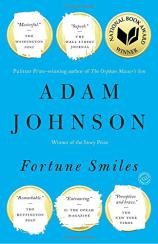Fortune Smiles: Stories
Review
Fortune Smiles: Stories
The six long stories in Adam Johnson's new collection, FORTUNE SMILES, only serve to reaffirm the quality of work that earned him the Pulitzer Prize for Fiction for his 2012 novel, THE ORPHAN MASTER'S SON. Realistic at their heart and in their execution, Johnson's stories manage to tip our world a couple of degrees off its axis. Pairing that style with a facility for placing his credible characters in interesting predicaments yields a powerful group of tales, most of which approach novelistic depth and texture.
At the heart of this collection is the brilliant "George Orwell Was a Friend of Mine," a devastating story told by the former warden of East Germany's Hohenschönhausen Prison. Now retired, he spends the days walking his dog in the shadow of the facility, now converted into a museum, rationalizing that he had nothing to do with the torture inflicted by the Stasi within its walls. The story's final pages feature a confrontation, expertly paced through the use of crackling dialogue, between the narrator and one of the prison's former inmates who works as a tour guide there, in which his protestations about his own lack of involvement in torture are tested. It's impossible to read it without recalling our own recent debates about enhanced interrogation techniques.
Johnson returns to the Korean Peninsula for the collection's title story. There, DJ and Sung-ho, two North Korean defectors, find themselves struggling to adapt to their new lives in South Korea's democracy. DJ, an engineer now working as a dishwasher, had run schemes "selling false hope, fake medicine and unsafe cars" to the Chinese to generate foreign currency, while his older companion had served vaguely as his protector. In their new, strange land, their roles have reversed; when they meet Mina, a musician defector, Sung-ho makes a decision that ends the story on a surreal, but beautiful, note.
"Realistic at their heart and in their execution, Johnson's stories manage to tip our world a couple of degrees off its axis. Pairing that style with a facility for placing his credible characters in interesting predicaments yields a powerful group of tales, most of which approach novelistic depth and texture."
Though technology insinuates itself into most of these stories, two --- "Nirvana" and "Dark Meadow" --- have it at their center. In the former, the unnamed narrator has developed an "algorithm that scrubs the Web and describes the results into a personal animation" to bring an assassinated president back to life, at least in stilted Q&A form. Meanwhile, the programmer's wife struggles to cope with her paralysis from Guillain-Barré syndrome. Her obsession with Kurt Cobain and her husband's programming skills intersect to bring the story to a moving climax. The protagonist of "Dark Meadow," known only by that pseudonym or his screen name DM14097, is an expert in computer security and a victim of child abuse who's fighting his own addiction to child pornography while working to prevent its spread. Despite their grounding in the world of technology, Johnson never neglects the human drama at the core of these stories.
The collection's most conventional story, "Hurricanes Anonymous," was included in BEST AMERICAN SHORT STORIES 2009. It follows Nonc, a young UPS deliveryman, and his two-year-old son, Geronimo, as they make their way around Lake Charles, Louisiana, in the aftermath of Hurricanes Katrina and Rita. The boy's mother has taken a "vacation from parenthood," leaving Nonc to care for Geronimo while he must deal with his estranged father, dying in a California hospital and unable to communicate with him except through notes read by a hospital aide. Though Nonc hardly has been affected by the natural disasters, like their victims he's faced with the challenge of coping with a new life. "Developments can happen right in front of you like that, you don't even see them," Nonc remarks, the subtle tipoff to the fateful decision he will make at the end of the story.
At some point in just about every one of these stories, Johnson detonates a small charge of insight or apt language, heightening the pleasure of his storytelling. The narrator of "Interesting Facts," a breast cancer survivor who's married to a novelist who's written a Pulitzer Prize-winning novel about North Korea, spends most of her time musing bitterly on how her family will think about her after she's gone. But for all her acid-tipped observations, she recognizes that "If I want them to stop treating me like a ghost, I need to stop acting like one." The museum curator in "George Orwell Was a Friend of Mine," watching students on the prison tour constantly check their smartphones and update their Facebook statuses, imagines how even the dreaded secret police "couldn't dream of a world in which citizens voluntarily carried tracking devices, conducted self-surveillance and reported on themselves, morning, noon and night."
Despite their length, it's common when reaching the end of these stories to wish they could have gone on. Johnson's concerns are so compelling, his characters so well-drawn and his writing so perceptive that it's natural to want to prolong the pleasures he delivers. For now, we'll have to content ourselves with the next best thing: a rereading of the book to discover the new depths and textures these stories assuredly will yield.
Reviewed by Harvey Freedenberg on September 11, 2015
Fortune Smiles: Stories
- Publication Date: October 4, 2016
- Genres: Fiction, Short Stories
- Paperback: 336 pages
- Publisher: Random House Trade Paperbacks
- ISBN-10: 0812987233
- ISBN-13: 9780812987232





